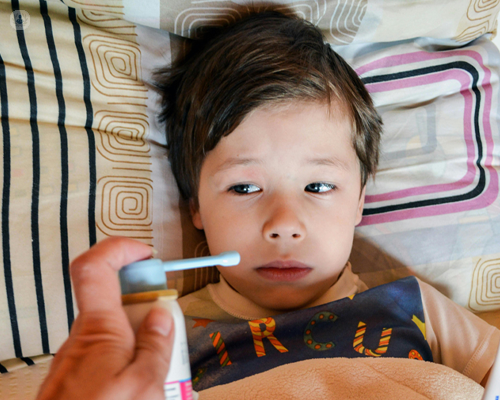Sore throats and their different causes: The common cold, strep throat and tonsillitis
Written in association with:When you have a sore throat, the throat’s inner lining becomes inflamed as your body responds to a viral or bacterial infection. It becomes dry, which can make eating and drinking uncomfortable, and make your voice become hoarse.
Strep throat, a specific type of bacterial infection, and tonsillitis both also causes a sore throat, in addition to other symptoms.
A frequent cause of sore throats is the common cold, which is caused by a viral infection and usually also leads to a runny, congested nose.
Leading consultant adult and paediatric ENT surgeon Miss Victoria Alexander takes a closer look at strep throat, tonsillitis and the common cold as causes of a sore throat, as well as how to spot the difference.

Strep throat
Strep throat is a very common infection that rarely causes serious health problems. It’s caused by the bacteria Streptococcus pyogenes, also known as group A streptococcus.
These infections usually occur soon after a viral infection. This is when your immune system is weakened and it can cause:
- a sore throat;
- fever;
- loss of voice;
- difficulty swallowing and;
- a bright red, bumpy rash all over your body.
It can also lead to tonsillitis.
Tonsillitis
Tonsillitis is usually caused by infection from the common cold or flu, which are viral infections. It can also be caused by strep throat.
Eating and drinking become painful when your tonsils swell. You may also have white pus-filled dots on your tonsils and lymph glands in your neck swell, feeling tender to touch. A fever is another common symptom of tonsillitis.
In some cases, tonsillitis can reoccur. If you end up missing work or school on a regular basis, and you get tonsillitis more than seven times in a year or have lots of infections year-on-year, you may need to have your tonsils removed.
Common cold
In most cases, colds are caused by an infection with rhinoviruses. However, they can also be caused by coronaviruses and respiratory viruses.
Cold symptoms include:
- a sore throat;
- sneezing, and;
- a runny, congested nose.
If a fever develops, it’s usually mild.
As mentioned previously, an infection with a common cold can lead to tonsillitis.
How do these infections spread?
Strep throat is spread mainly two ways. These are:
- direct contact with droplets from a cough or sneeze, which can land on surfaces or body parts, or;
- direct contact with weeping sores which can develop as part of the skin rash caused by strep infection.
The common cold is also spread through droplets from a cough or sneeze. However, unlike strep throat, it can’t be spread through skin contact.
In children, keeping up with vaccinations can reduce the risk of developing strep throat. They work by preventing other infections, for example measles or meningitis, which can weaken the immune system and leave children more vulnerable to group A streptococcus infections.
How are common colds, strep throat and tonsillitis treated?
In most cases, strep throat, a common cold and tonsillitis will get better on their own. However, you can take steps to relieve your symptoms as you recover.
Treating a common cold
Over-the-counter painkillers like paracetamol and ibuprofen, drinking lots of water and taking lozenges that contain a local anaesthetic will all help to relieve symptoms.
You can also use over-the-counter salt water nose rinses. These help to remove the excess mucus in your nose and sinuses, while steam inhalation using warm water can also help remove the mucus.
Decongestant nasal sprays can help. However, it’s important to only use these for the most acute period of your infection and for no longer than five days. Prolonged use can worsen nasal congestion.
Treating strep throat
Strep throat can go away without antibiotics. However, if you develop a very high fever and struggle to eat and drink, a course of antibiotics may be needed.
You can also take over-the-counter painkillers and lozenges to soothe your sore throat. Make sure you rest and drink lots of water, too.
Treating tonsillitis
Drinking cool drinks and gargling with warm salt water can help to soothe your throat. Make sure you rest well, drink lots of water, and take regular over-the-counter painkillers if you feel uncomfortable.
Lozenges and throat sprays that contain local anaesthetic can also help relieve your symptoms.
See your GP if your symptoms don’t improve after four days.
Usually, tonsillitis is caused by a viral infection. However, in some cases it can be caused by a bacterial infection. You can get a swab of your tonsils done by your GP, in order to test whether or not your infection is viral or bacterial, if they aren’t sure. If it’s bacterial, they may prescribe a course of antibiotics to help speed up your recovery.
With tonsillitis, it can sometimes lead to an abscess (a pus-filled sac) behind your tonsils. This can cause:
- severe throat pain;
- ear pain on one side;
- a change in your voice and;
- an inability to swallow any liquids due to the pain.
In this case, see your GP; they may refer you to an ENT surgeon who can arrange to have the abscess drained.
When should I see a doctor about a sore throat?
Strep throat can cause serious illness in both children and adults.
If your child is under five and has:
- a persistent fever;
- isn’t eating;
- drinking or sleeping well;
- has muscle aches, or;
- is behaving differently;
see your GP or call 111.
Adults should arrange an appointment with their GP if you notice:
- a persistent fever with severe neck and joint pain, which isn’t relieved by over-the-counter painkillers, or;
- you can’t eat or drink.
Concerned about a sore throat, or any of its causes discussed in this article? Arrange a consultation with Miss Alexander via her Top Doctors profile.


